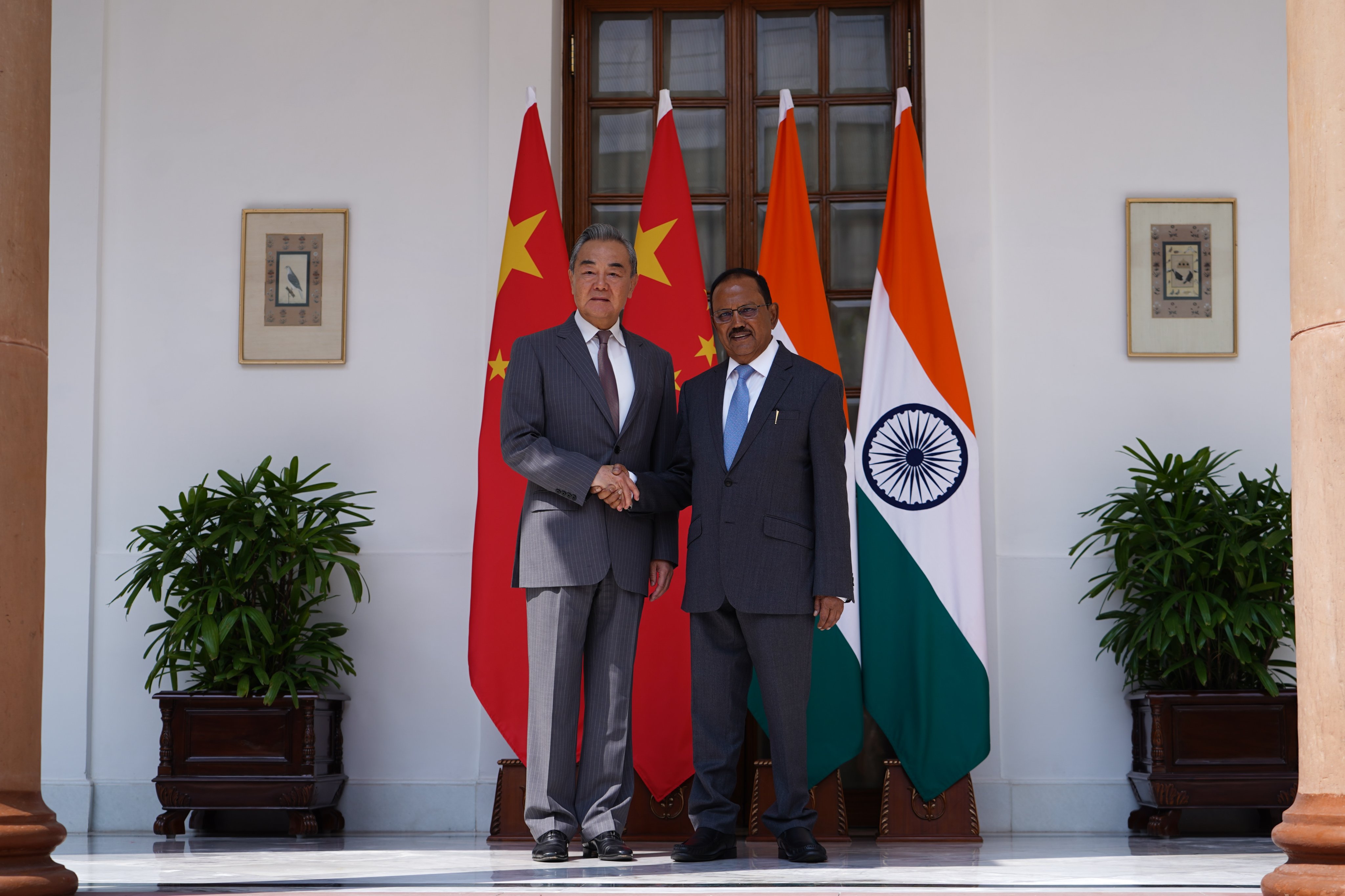India and China Agree to Reopen Border Trade, Resume Flights, and Boost Cooperation Amid Global Tensions
India and China on Tuesday announced a series of confidence-building measures designed to ease tensions and stabilize bilateral ties, following the 24th round of the Special Representatives’ dialogue on the boundary question.
 |
| Image Source: Chinese Ambassador to India |
The meeting followed Wang Yi’s two-day visit to India, during which he also met External Affairs Minister S. Jaishankar and Prime Minister Narendra Modi.
At Modi’s official residence, 7 Lok Kalyan Marg, Wang conveyed an invitation from Chinese President Xi Jinping for the Indian Prime Minister to attend the Shanghai Cooperation Organisation (SCO) Summit in Tianjin later this month -- a visit that will mark Modi’s first trip to China since the 2020 Galwan Valley clashes.
Key Agreements Announced
Border Trade: Both sides agreed to reopen trade through the three designated Himalayan passes -- Lipulekh, Shipki La, and Nathu La. Trade through these routes, historically limited but symbolically significant, had been disrupted following the deterioration in relations after Galwan.
The reopening is expected to boost cross-border economic activity and local livelihoods in border regions.
Flights and Visas: India and China will resume direct flights between the two countries “at the earliest” and finalize an updated Air Services Agreement. Prior to the Covid-19 pandemic and subsequent tensions, airlines from both countries operated multiple direct connections.
Alongside this, the two sides agreed to ease visa procedures for tourists, businesses, media professionals, and other categories of visitors, restoring people-to-people exchanges as a pillar of bilateral engagement.
Investment and Dialogue Mechanisms: In a joint outcome list shared by Chinese Ambassador Xu Feihong, the two countries pledged to facilitate trade and investment flows through “concrete measures” and agreed to explore the resumption of official dialogue mechanisms.
This includes holding the Third Meeting of the India-China High-Level Mechanism on People-to-People Exchanges in 2026, expanding platforms for cooperation.
Trans-Border Rivers: Both sides reaffirmed their cooperation through the Expert Level Mechanism, with China committing to share hydrological data during emergencies on humanitarian grounds.
India has long raised concerns over large hydropower projects on the Yarlung Tsangpo (Brahmaputra) and their potential downstream impacts.
Boundary Issue: The core of the talks focused on the long-running boundary question. The two sides agreed to seek a “fair, reasonable and mutually acceptable” settlement in line with the 2005 guiding principles agreement.
They decided to establish a new Expert Group under the Working Mechanism for Consultation and Coordination on India-China Border Affairs (WMCC) to advance early progress in boundary delimitation and explore “early harvest” solutions. A separate Working Group will also be formed to strengthen effective border management.
Both sides noted that the border has remained quiet since the last round of talks, with peace and tranquillity largely maintained. They underlined that continued stability is essential for broader progress in bilateral ties.
Multilateral Cooperation: Beyond bilateral concerns, the two governments reaffirmed their support for multilateralism and a rules-based international order with the World Trade Organization at its core.
Both stressed their commitment to a multipolar world order that protects the interests of developing countries.
India reaffirmed support for China’s presidency of the SCO Summit in Tianjin and expressed readiness to contribute to its success.
China, in turn, welcomed India’s hosting of the 2026 BRICS Summit and pledged support, while India will back China’s hosting of the 2027 BRICS Summit. Both countries also agreed to mark the 75th anniversary of diplomatic relations in 2025 with commemorative events.
Context of the Engagement
Tuesday’s announcements mark the most comprehensive set of confidence-building steps since relations soured following the Galwan Valley clashes in June 2020, which left soldiers on both sides dead and sent ties into their most serious crisis in decades.
Since then, India has restricted Chinese technology companies and increased scrutiny of Chinese investment, while China maintained strict controls along the Line of Actual Control (LAC).
The agreements also come against the backdrop of shifting global geopolitics. The United States has escalated tariff measures against both India and China, putting additional pressure on New Delhi and Beijing to stabilize ties and explore cooperative alternatives through multilateral platforms such as BRICS and the SCO.
For India, the restoration of border stability and economic connectivity is tied to its wider foreign policy balance: maintaining competition and cooperation with China while deepening strategic alignment with the United States and other partners.
For China, the outreach reflects both its interest in consolidating its SCO presidency and managing its contested borders amid broader tensions with Washington.
Statements and Outcomes
Ambassador Xu Feihong summarized the meeting outcomes on social media, emphasizing that both sides acknowledged the “irreplaceable and crucial role” of their top leadership in guiding bilateral relations.
The statement noted that “a stable, cooperative and forward-looking bilateral relationship is in their mutual interest to realize their development potential fully.”
Both governments agreed to support each other in hosting major diplomatic events, from the SCO and BRICS Summits to the upcoming 75th anniversary of India-China diplomatic relations.
Notably, the list of outcomes also included commitments to expand Indian pilgrimages to Mount Kailash and Lake Manasarovar in 2026.
Jaishankar, in his talks with Wang Yi, reiterated India’s concerns over terrorism, including cross-border terrorism, and raised the issue of large-scale Chinese hydropower construction on the Yarlung Tsangpo.
The Chinese side, according to official readouts, expressed readiness to continue sharing data and address issues “in a spirit of cooperation.”
